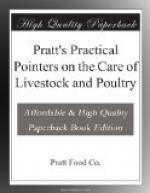Common causes of colic are sudden changes of food; feeding too much or too seldom; feeding when the horse is hot and tired; watering or working too soon after a meal; feeding new oats, or new hay, or grass; or, in short, anything that is apt to derange digestion. There are various forms of colic. In cramp (spasmodic) colic, pains come and go and the horse rolls violently and fearlessly. In wind (flatulent) colic there is bloating of the right flank and the horse lies down, rolls without violence, breathes with difficulty, paws, looks around at his sides and finds no relief. In bloat of the stomach, gas and fluid gush back and forth from the stomach to the throat; flanks may not show bloat; pain is steady but not violent; horse sweats; nostrils flap; pulse is fast and weak; countenance is haggard and anxious. In enteritis (inflammation of the bowels) pain is constant and severe; the horse makes frequent attempts to lie down but is afraid to do so; pulse and temperature run high; membranes of eyelids, nostrils, and mouth are red; bowels and bladder do not act; horse may walk persistently in a circle. In impaction of the bowels, pains are comparatively mild or fugitive; horse is restless, paws often, strains and passes no manure, or only a few balls covered with slime and streaks of white mucus. In gut-tie, hernia, and other absolute stoppage of the bowels, symptoms of enteritis are common and the horse may, when down, strain and then sit on his haunches. The latter condition, and enteritis, usually prove fatal. Wind colic may need prompt use of the trocar and cannula to puncture high up in the right flank for liberation of gas. In impaction, raw linseed oil should be freely given in repeated doses of one pint, and rectal injections of soapy warm water and glycerine will help. No irritants should be inserted in the vagina or sheath in any form of colic. Stoppage of urine is a result of pain, not the cause of colic. The urine will come when the pain subsides. A good all-around colic remedy will be found in Pratts Veterinary Colic Remedy. It is compounded from the prescription of a qualified veterinarian and has a record of curing 998 cases out of 1,000 treated.
Constipation
All horses should be given a warm bran mash weekly and Pratts Animal Regulator daily, and constipation will be unknown. Constipation is often the cause of hide bound, rough coat and loss of flesh. Give a good physic of linseed oil, aloes or cantor oil, and use the Regulator mentioned above.
Coughs
Cause.—Chronic coughs are the result of distemper, sore throat, a neglected cold, catarrh or dusty hay, and frequently turn into heaves, bronchitis, etc.
Treatment.—Give only the best and most nourishing foods, dampened. Keep horse warm, and blanketed in a well ventilated stable.
If there is a swelling of the throat it should be blistered with Pratts Liniment, or Pratts Spavin Paste—A Blister. Use Pratts Heave, Cough and Cold Remedy according to directions.




